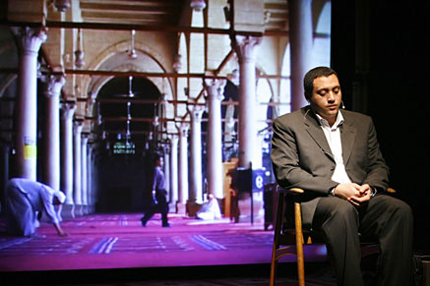What still resonates, and organizes for me the memory of the entire piece, is the sentence, pronounced quite early on, stating that one of the muezzin’s would only join the others on stage “later…” This announced delay, this procrastinated entering suggests already a kind of separation between those present on stage since the beginning and the belated one, and dramaturgically produces a sense of anticipation clouded by a question: “Why will he come only later?”
The answer is given immediately upon the last Muezzin’s arrival. Clad in a smooth, well cut grey suit, moving with the gentleness of a cat, or with the thick lightness of a cloud, he arrives with his own tempo and timing, late, later, after all: the time of the state.
Because it is all about marking time, or about how to tell time, to sign time in order to call a community to gather and pray at specific intersections between sun and earth throughout each and every day, until the end of days. The voice resounds in the hollows of the city, of the body, the voice makes a body that can voice the call of God, the voice is what is left of the body after its surrender to the call of God calling the voice to become space and time and thus weave a kind of polis. There is then polyphony, but there is also an inevitable heterochronicity in the calls made by thousands of Muezzins. Now, the time has come for one single voice to weave back the city along one single thread, one singly mode of reverberation, one single pitch – and inevitably one single, self-synchronous time.
The late one will, for now on, voice the calls, will place the calls in proper timing. His late body-cloud as consistent and grave and honorable and honored as his duty is. And this is why he must take his time, and be late, or actually, not be late, but arrive after all, be the last one, as an epiphany or apotheosis.
What also resonates, but this time visually, is the manner of the electronic engineer across the stage from the Stately Muezzin. Knowledgable hands, hair standing as if too much electricity was running through, a precise sense of duty: a technology must be developed so that the single voice replaces polyphony and the single time replaces heterochronicity. A synchronized system of radio transmission will place the call now, according to precise tabulations of local time – Sun, Earth, God, Radio, and the unearthly voice of the chosen one, body as thick and beautiful and supple and consistent and solid as the voice of God.
Stage-wise, the set is set-out beautifully: stage-right, the table with electronic materials where the engineer builds his transmitter and receiver; stage-left a heavy-weight lifting set, where the late one displays his enormous strength, muscles as hard as iron, body as consistent as a cloud.
In the end, the unforgettable image-sound: a black loudspeaker, standing, as if coming from another century (early radiophony, the medium of choice of early 20th century tyrants and schizos) amplifying the ethereal force of the Stately proxy for the call of God.


